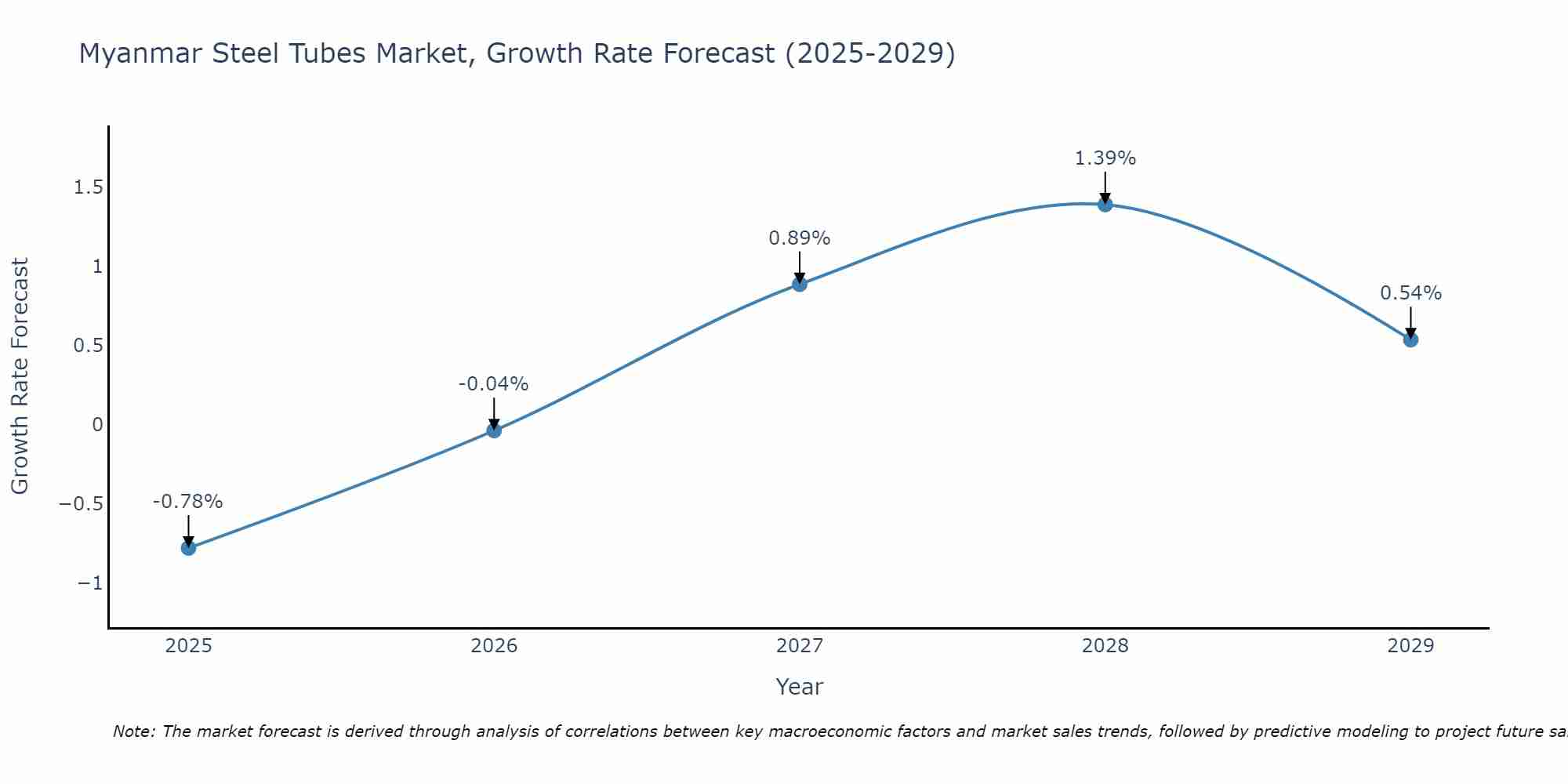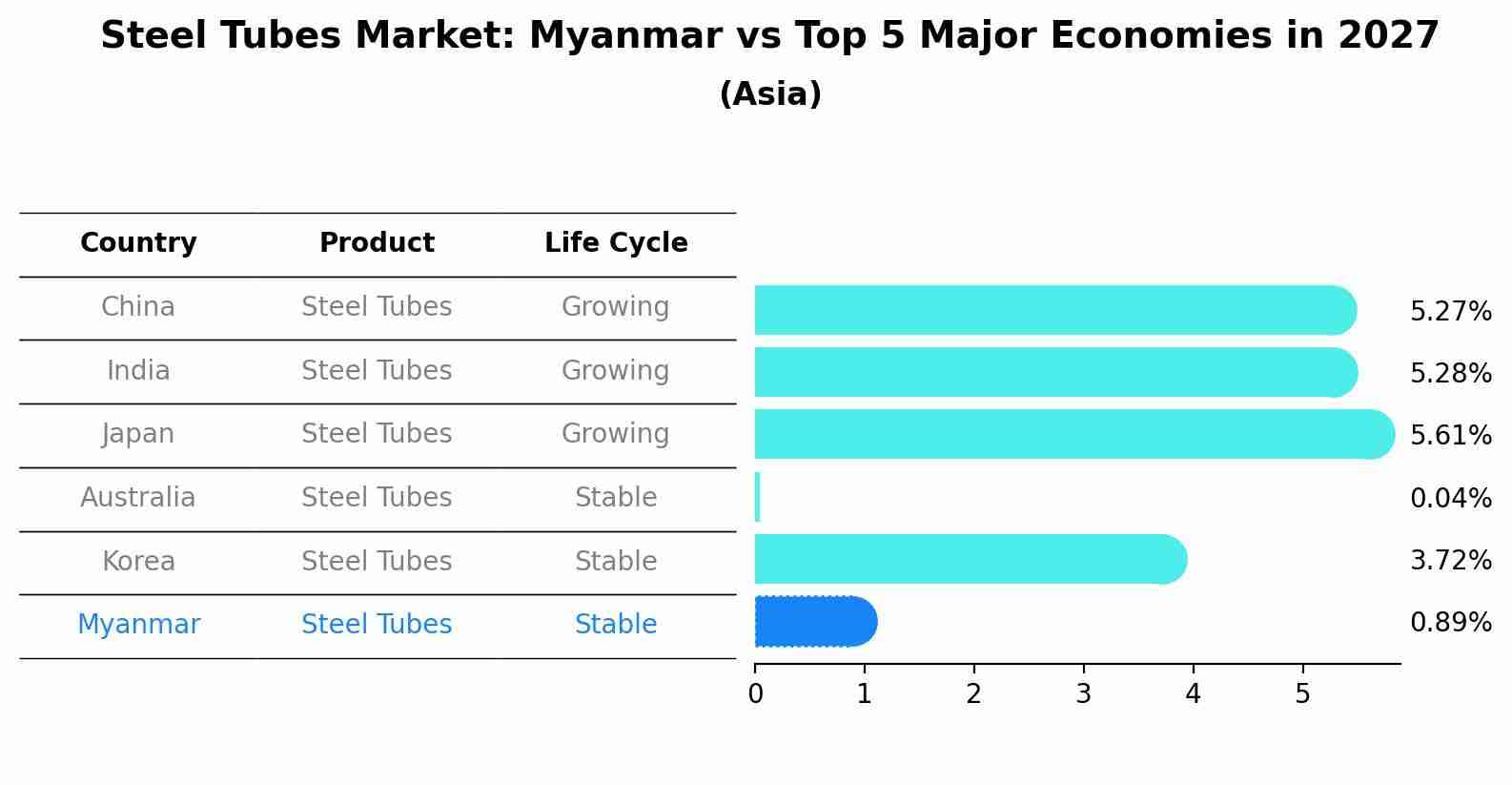Myanmar Steel Tubes Market (2025-2031) Outlook | Size, Forecast, Revenue, Value, Share, Growth, Analysis, Trends, Industry & Companies
| Product Code: ETC359494 | Publication Date: Aug 2022 | Updated Date: Aug 2025 | Product Type: Market Research Report | |
| Publisher: 6Wresearch | Author: Summon Dutta | No. of Pages: 75 | No. of Figures: 35 | No. of Tables: 20 |
Myanmar Steel Tubes Market Size Growth Rate
The Myanmar Steel Tubes Market is projected to witness mixed growth rate patterns during 2025 to 2029. The growth rate begins at -0.78% in 2025, climbs to a high of 1.39% in 2028, and moderates to 0.54% by 2029.

Steel Tubes Market: Myanmar vs Top 5 Major Economies in 2027 (Asia)
The Steel Tubes market in Myanmar is projected to grow at a stable growth rate of 0.89% by 2027, highlighting the country's increasing focus on advanced technologies within the Asia region, where China holds the dominant position, followed closely by India, Japan, Australia and South Korea, shaping overall regional demand.

Myanmar Steel Tubes Market Synopsis
The Myanmar steel tubes market is experiencing steady growth due to increasing construction activities, infrastructure development, and industrial projects in the country. The demand for steel tubes is driven by their use in various applications such as building construction, water supply systems, oil and gas pipelines, and industrial machinery. Key players in the market are focusing on product innovation, quality improvement, and strategic partnerships to gain a competitive edge. The market is also witnessing a shift towards sustainable and environmentally friendly steel tube manufacturing processes. However, challenges such as fluctuating raw material prices and competition from alternative materials like PVC and aluminum tubes are impacting market growth. Overall, the Myanmar steel tubes market is poised for further expansion with opportunities for growth in various end-user industries.
Myanmar Steel Tubes Market Trends
The Myanmar Steel Tubes Market is experiencing steady growth driven by increasing infrastructure development projects, particularly in the construction and energy sectors. The demand for steel tubes is rising due to their wide applications in structural support, transportation of fluids, and industrial machinery. The market is witnessing a shift towards higher quality and more durable steel tubes to meet the stringent requirements of modern construction projects. Additionally, the government`s initiatives to promote foreign investments and industrialization are expected to further boost the market growth. Key players in the market are focusing on product innovations, sustainable manufacturing practices, and strategic partnerships to gain a competitive edge in this growing market. Overall, the Myanmar Steel Tubes Market is poised for continued expansion in the coming years.
Myanmar Steel Tubes Market Challenges
The Myanmar Steel Tubes Market faces several challenges, including inconsistent regulatory frameworks, lack of infrastructure development, reliance on imported raw materials, and competition from cheap imports. Inconsistent government policies and regulations create uncertainty for industry players, hindering long-term planning and investments. The inadequate infrastructure, such as transportation and energy supply, adds to the production costs and delays project timelines. The industry`s reliance on imported raw materials exposes it to currency fluctuations and supply chain disruptions. Additionally, the presence of low-cost steel tube imports from neighboring countries puts pressure on local manufacturers to compete on pricing, impacting their profitability and market share. Overcoming these challenges will require strategic collaborations between industry stakeholders, government intervention to provide a conducive business environment, and investments in infrastructure development.
Myanmar Steel Tubes Market Investment Opportunities
The Myanmar steel tubes market presents promising investment opportunities due to the country`s growing infrastructure development and industrial expansion. With increasing demand for steel tubes in construction, oil and gas, automotive, and other sectors, there is a need for reliable and high-quality suppliers in the market. Investing in steel tube manufacturing facilities or distribution networks could be lucrative. Additionally, there is potential for technological advancements and innovation in the sector to meet the evolving needs of the market. Partnering with local companies or establishing joint ventures could provide a strategic entry point into this growing market, with the potential for long-term growth and profitability. However, investors should be mindful of regulatory challenges and market competition when considering investments in the Myanmar steel tubes market.
Jordan Agar Market Government Policies
In Myanmar, the government has implemented various policies to promote and regulate the steel tubes market. These policies include import restrictions on certain types of steel tubes to protect domestic manufacturers, as well as the imposition of tariffs on imported steel tubes to maintain a level playing field for local producers. Additionally, the government has introduced measures to improve the quality standards of steel tubes through certifications and inspections, ensuring that products meet safety and performance requirements. Furthermore, the government has encouraged foreign investment in the steel industry through incentives and partnerships to boost production capacity and technological advancements in the market. Overall, these policies aim to support the growth and competitiveness of the Myanmar steel tubes market while safeguarding the interests of domestic stakeholders.
Myanmar Steel Tubes Market Future Outlook
The future outlook for the Myanmar Steel Tubes Market appears promising, driven by rapid urbanization, infrastructure development, and increasing construction activities in the country. The demand for steel tubes is expected to rise significantly as they are essential components in various industries such as construction, automotive, and manufacturing. Additionally, government initiatives to improve transportation networks and investments in industrial projects are likely to further boost the market growth. However, challenges such as fluctuating raw material prices and intense competition from imports may impact the market dynamics. Overall, with the ongoing development projects and industrial expansion in Myanmar, the steel tubes market is anticipated to witness steady growth in the coming years.
Key Highlights of the Report:
- Myanmar Steel Tubes Market Outlook
- Market Size of Myanmar Steel Tubes Market, 2024
- Forecast of Myanmar Steel Tubes Market, 2031
- Historical Data and Forecast of Myanmar Steel Tubes Revenues & Volume for the Period 2021 - 2031
- Myanmar Steel Tubes Market Trend Evolution
- Myanmar Steel Tubes Market Drivers and Challenges
- Myanmar Steel Tubes Price Trends
- Myanmar Steel Tubes Porter's Five Forces
- Myanmar Steel Tubes Industry Life Cycle
- Historical Data and Forecast of Myanmar Steel Tubes Market Revenues & Volume By Product Type for the Period 2021 - 2031
- Historical Data and Forecast of Myanmar Steel Tubes Market Revenues & Volume By Seamless Steel Tubes for the Period 2021 - 2031
- Historical Data and Forecast of Myanmar Steel Tubes Market Revenues & Volume By Welded Steel Tubes for the Period 2021 - 2031
- Historical Data and Forecast of Myanmar Steel Tubes Market Revenues & Volume By Material Type for the Period 2021 - 2031
- Historical Data and Forecast of Myanmar Steel Tubes Market Revenues & Volume By Carbon Steel for the Period 2021 - 2031
- Historical Data and Forecast of Myanmar Steel Tubes Market Revenues & Volume By Stainless Steel for the Period 2021 - 2031
- Historical Data and Forecast of Myanmar Steel Tubes Market Revenues & Volume By Alloy Steel for the Period 2021 - 2031
- Historical Data and Forecast of Myanmar Steel Tubes Market Revenues & Volume By Others for the Period 2021 - 2031
- Historical Data and Forecast of Myanmar Steel Tubes Market Revenues & Volume By End Use for the Period 2021 - 2031
- Historical Data and Forecast of Myanmar Steel Tubes Market Revenues & Volume By Oil and Gas for the Period 2021 - 2031
- Historical Data and Forecast of Myanmar Steel Tubes Market Revenues & Volume By Petrochemicals for the Period 2021 - 2031
- Historical Data and Forecast of Myanmar Steel Tubes Market Revenues & Volume By Infrastructure and Construction for the Period 2021 - 2031
- Historical Data and Forecast of Myanmar Steel Tubes Market Revenues & Volume By Automotive for the Period 2021 - 2031
- Historical Data and Forecast of Myanmar Steel Tubes Market Revenues & Volume By Water Treatment and Sewage for the Period 2021 - 2031
- Historical Data and Forecast of Myanmar Steel Tubes Market Revenues & Volume By Others for the Period 2021 - 2031
- Myanmar Steel Tubes Import Export Trade Statistics
- Market Opportunity Assessment By Product Type
- Market Opportunity Assessment By Material Type
- Market Opportunity Assessment By End Use
- Myanmar Steel Tubes Top Companies Market Share
- Myanmar Steel Tubes Competitive Benchmarking By Technical and Operational Parameters
- Myanmar Steel Tubes Company Profiles
- Myanmar Steel Tubes Key Strategic Recommendations
Frequently Asked Questions About the Market Study (FAQs):
- Single User License$ 1,995
- Department License$ 2,400
- Site License$ 3,120
- Global License$ 3,795
Search
Thought Leadership and Analyst Meet
Our Clients
Related Reports
- Afghanistan Apparel Market (2026-2032) | Growth, Outlook, Industry, Segmentation, Forecast, Size, Companies, Trends, Value, Share, Analysis & Revenue
- Canada Oil and Gas Market (2026-2032) | Share, Segmentation, Value, Industry, Trends, Forecast, Analysis, Size & Revenue, Growth, Competitive Landscape, Outlook, Companies
- Germany Breakfast Food Market (2026-2032) | Industry, Share, Growth, Size, Companies, Value, Analysis, Revenue, Trends, Forecast & Outlook
- Australia Briquette Market (2025-2031) | Growth, Size, Revenue, Forecast, Analysis, Trends, Value, Share, Industry & Companies
- Vietnam System Integrator Market (2025-2031) | Size, Companies, Analysis, Industry, Value, Forecast, Growth, Trends, Revenue & Share
- ASEAN and Thailand Brain Health Supplements Market (2025-2031) | Strategy, Consumer Insights, Analysis, Investment Trends, Opportunities, Growth, Size, Share, Industry, Revenue, Segments, Value, Segmentation, Supply, Forecast, Restraints, Outlook, Competition, Drivers, Trends, Demand, Pricing Analysis, Competitive, Strategic Insights, Companies, Challenges
- ASEAN Bearings Market (2025-2031) | Strategy, Consumer Insights, Analysis, Investment Trends, Opportunities, Growth, Size, Share, Industry, Revenue, Segments, Value, Segmentation, Supply, Forecast, Restraints, Outlook, Competition, Drivers, Trends, Demand, Pricing Analysis, Competitive, Strategic Insights, Companies, Challenges
- Europe Flooring Market (2025-2031) | Outlook, Share, Industry, Trends, Forecast, Companies, Revenue, Size, Analysis, Growth & Value
- Saudi Arabia Manlift Market (2025-2031) | Outlook, Size, Growth, Trends, Companies, Industry, Revenue, Value, Share, Forecast & Analysis
- Uganda Excavator, Crane, and Wheel Loaders Market (2025-2031) | Strategy, Consumer Insights, Analysis, Investment Trends, Opportunities, Growth, Size, Share, Industry, Revenue, Segments, Value, Segmentation, Supply, Forecast, Restraints, Outlook, Competition, Drivers, Trends, Demand, Pricing Analysis, Competitive, Strategic Insights, Companies, Challenges
Industry Events and Analyst Meet
Whitepaper
- Middle East & Africa Commercial Security Market Click here to view more.
- Middle East & Africa Fire Safety Systems & Equipment Market Click here to view more.
- GCC Drone Market Click here to view more.
- Middle East Lighting Fixture Market Click here to view more.
- GCC Physical & Perimeter Security Market Click here to view more.
6WResearch In News
- Doha a strategic location for EV manufacturing hub: IPA Qatar
- Demand for luxury TVs surging in the GCC, says Samsung
- Empowering Growth: The Thriving Journey of Bangladesh’s Cable Industry
- Demand for luxury TVs surging in the GCC, says Samsung
- Video call with a traditional healer? Once unthinkable, it’s now common in South Africa
- Intelligent Buildings To Smooth GCC’s Path To Net Zero


















